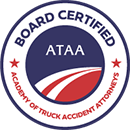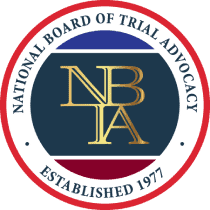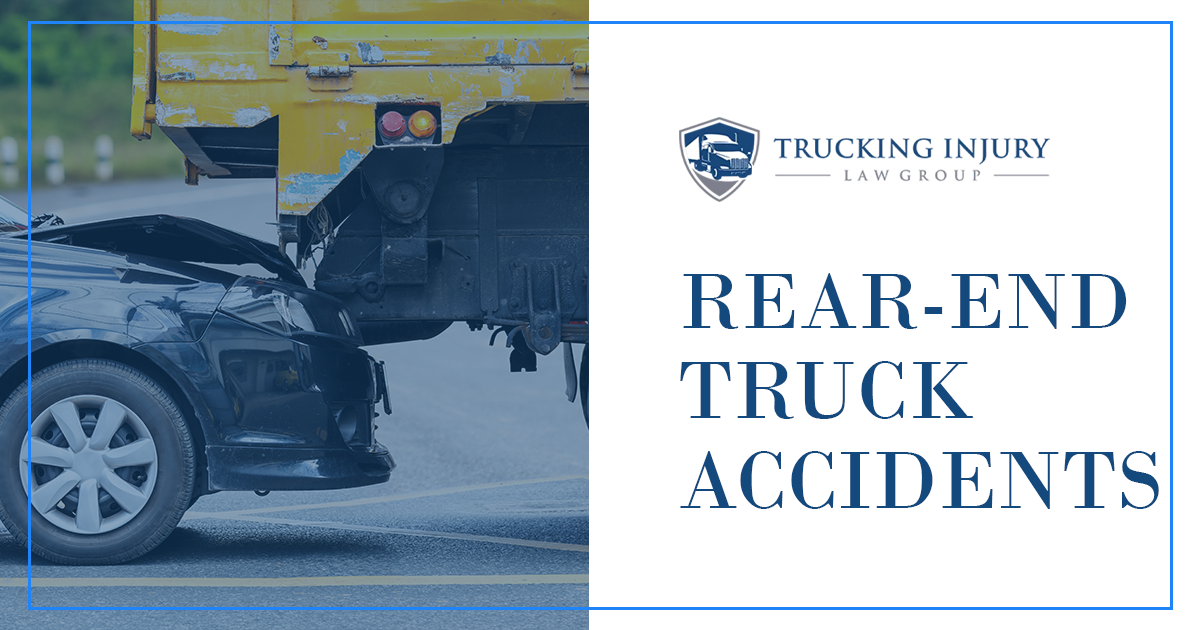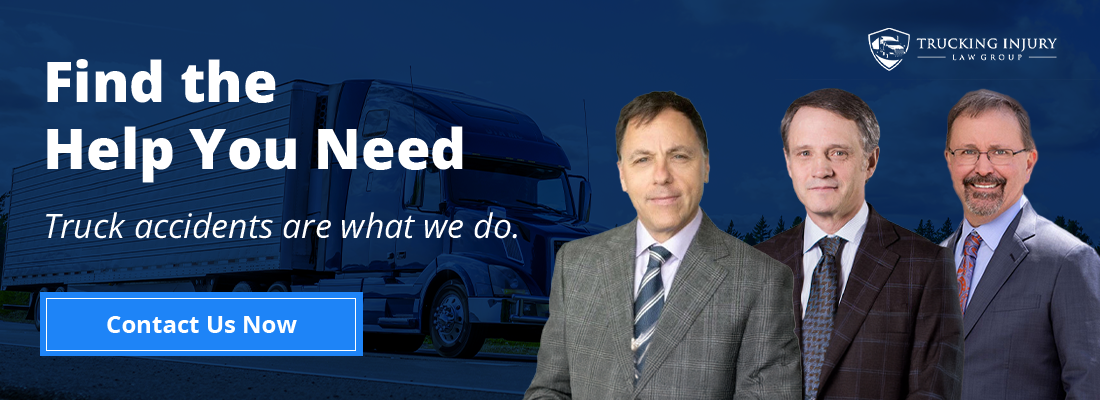Rear-End Collisions
Many drivers fear sharing the road with truckers because there’s often a significant difference in the size of the automobiles. One of the reasons why motorists fear driving alongside tractor-trailers is over a concern that a trucker will stop suddenly, causing a motor vehicle to become lodged under it. Additionally, passenger car operators fear the implications that a truck that’s multiple times the size of and weighs much more than their vehicle can cause.
Each year, countless motorists like you suffer serious injuries or lose their loved ones in rear-end truck collisions. Our legal team at Trucking Injury Law Group is here for them to explain their rights to take legal action. We want to be a source of reliable information for you, too. Reach out to our law firm to schedule a free initial consultation to discuss your case. There’s no risk or obligation in meeting with a rear-end truck accident lawyer from our office, so contact us today.
Rear-End Truck Accident Statistics and Facts
Data published by the National Highway Traffic Safety Administration (NHTSA) shows that rear-end collisions are more common than other types of motor vehicle accidents. That federal agency’s statistics show that nearly 29% of all crashes are rear-end ones.
While this data doesn’t break down crashes by vehicle type to know how many of these wrecks are truck-involved ones, a previous Federal Motor Carrier Safety Administration report suggested that rear-end crashes could account for over 23% of all truck accidents.
What Are the Most Common Reasons Truckers Collide With the Tail End of Cars?
Each lawyer on our team has handled their fair share of rear-end truck collision cases. In doing so, they’ve found that some of the reasons why passenger car operators become involved in these accidents include because a truck driver:
- Engages in distracted driving, such as cell phone use, despite it being illegal
- Speeds or drives too fast for weather or road conditions, such as on wet or icy roads or in a construction zone
- Drives while sleepy or fatigued, such as in violation of state or federal trucking regulations, like hours-of-service rules
- Fails to yield to another’s right of way, including running a red light or stop sign
- Operates their truck while intoxicated from alcohol or drugs
- Tailgates other motorists
- Changes lanes or merges in ahead of other drivers without ensuring there’s adequate room to do so
When it comes to trucker errors, another big issue that often results in rear-end crashes is driver inexperience. Commercial motor vehicle operators are no different from any other motorist in that it can take time for them to master how long it takes for a truck to brake in certain situations, such as when the trailer is full versus when it isn’t or when they’re traveling at a certain speed. Rear-end accidents are most apt to occur during the earlier stages of a trucker’s career as they’re trying to get their bearings.
Other Causes of Rear-End Truck Accidents
While tractor-trailer operators are often to blame for causing rear-end crashes, other factors that may also result in such an accident include:
- Poor lighting: This may include a situation where lighting is poor, either due to inclement weather or the presence of inadequate lights, along the stretch of roadway the tractor-trailer operator is traveling along, making it challenging to see other drivers. Also, motorists who don’t have their lights illuminated might make it difficult for them if they come into a truck’s path.
- Mechanical failure: Brake failures are often responsible for rear-end truck collisions; however, an accelerator that gets stuck in position and various other malfunctioning components could result in the same.
Even when a trucker is not to blame for a rear-end collision, driver error of a passenger car operator may be. For example, if they carry out any of the many reckless driving behaviors described above in the previous section, they too could cause rear-end truck crashes.
Whether you’re certain what caused the crash that injured you or claimed the life of a loved one, or you’re unsure, we urge you to reach out to us at Trucking Injury Law Group. We’ll put you in contact with a rear-end truck accident lawyer when you do so that they can begin evaluating causation in your case, which is necessary to determine what your legal options are. This meeting is free of charge, so reach out by email or phone to schedule that meeting now.
Most Common Tailgating Accident Injuries
One of the biggest injury risks associated with a rear-end crash between two passenger cars would typically be whiplash. However, injuries tend to be far worse than that when at least one of the vehicles involved in the crash is a truck and, more specifically, an 18-wheeler.
Some common injuries our rear-end truck accident lawyers find that victims suffer include:
- Crushed limbs
- Bone fractures
- Traumatic brain injuries
- A spinal cord injury and other types of back injuries
- Internal organ damage, such as a ruptured spleen or severed liver or pancreas
- Compression injuries
- Bruises
- Lacerations (cuts)
Are Rear-End Truck Wrecks Always To Blame on Truckers?
Individuals often wrongfully assume that in a crash between unequally sized vehicles like a car and a truck, the trucker must always be at fault for what happened. That’s not always the case, though. You have to keep in mind that a rear-end collision can take on many forms, such as one where:
- A truck rear-ended a passenger car directly
- Another passenger or commercial vehicle rear-ended a trucker, involuntarily pushing their tractor-trailer into the rear of your car
- A passenger car rear-ended a truck, perhaps becoming stuck under the trailer’s rear-guard
Since rear-end accidents can happen in a number of ways, there may also be various parties responsible for their occurrence, such as:
- Passenger car drivers: This may be the case if their vehicle becomes mechanically unsound or they suddenly, unexpectedly apply their brakes.
- Truck drivers: Any trucker engaging in any of the reckless behaviors described in the causes of rear-end truck accidents may be to blame for what happened. Even if the trucker who actually struck you didn’t contribute to the crash by engaging in any negligence, another passenger car motorist or semi-truck operator around them could have been, resulting in the 18-wheeler that struck you being hit and, in turn, causing a chain reaction crash in which you too got struck.
- A fleet company: Many truckers are employed by a trucking company, whereas others may work for themselves. In the case of the former, it may be that the truck company bears some responsibility for maintaining the tractor-trailer, including inspecting their equipment and repairing it when needed. If they dropped the ball in doing this, this may give way to a rear-end truck crash.
- Manufacturers: This may include car or truck brands that designed or built passenger cars, commercial vehicles like tractor-trailers, or the companies that produced the after-market parts used to repair them.
- Mechanics: Self-employed truckers and some trucking companies will have independent mechanics work on their semi-trucks when an inspection or poor performance reveals there are issues. It can make a truck dangerous to operate if they miss repairing something, and large commercial vehicles like these make it back out on the road.
As you can probably already tell, since there may be various different parties responsible for a crash (or a combination thereof), it can be extremely helpful to consult with a rear-end truck accident attorney about your crash to determine whether you have a valid insurance company claim and if so, who you might want to pursue for damages you have incurred.
How Trucking Accident Lawyers Determine Liability for Fender Benders
Determining liability is generally one of the most challenging aspects of any commercial truck accident case. A truck accident attorney will often evaluate a wide range of evidence, including the following, to sort out how and why the collision occurred:
- The police report made at the crash scene
- Any photographs that may have been taken at the accident scene of property damage vehicles sustained and your injuries
- Black box data, which records information like trucker speed, hard stops, aggressive acceleration, and idle time
- A trucker’s driving safety and employment records showing previous accidents, violations, and potential health and drug or alcohol screening test results
- Electronic logging device (ELD) data is a type of trucking technology that shows how long a shift lasted, if breaks were taken, and drive distance
- Witness accounts taken at the scene of the wreck or via deposition since the crash occurred
- Any crash reconstructionist reports that may provide a qualified, professional opinion on how the wreck transpired
- Other expert witnesses’ opinions
- Medical records that may fill in the gaps about how the crash occurred, substantiating causation
In rare cases, full liability rests with the driver. Sometimes, that liability extends to the company that employs the driver. However, they might not be the only negligent parties. For example, if the accident was caused by negligent maintenance, such as brake failure, the parts manufacturer or even the repair mechanics could be liable for the accident. This is just one of the reasons why getting an attorney involved in assessing liability for your rear-end trucking accident is crucial.
Compensation You Can Recover After a Rear-End Crash With a Tractor-Trailer
There are a few different types of damages rear-end trucking accident victims may amass, many of which may be calculable starting soon after an accident occurs, including:
- Property damage
- Medical bills
- Lost wages
Also, since rear-end collisions are often so catastrophic and result in severe injuries, another type of damages recoverable by filing a truck accident claim is future medical expenses and lost earnings.
It’s, sadly, not uncommon for a rear-end accident to cause fatalities, especially when the force of the impact is so significant that it results in an automobile being crushed like an accordion. Our multi-state law group often assists the surviving loved ones of deceased truck accident victims in filing a wrongful death lawsuit with a negligent party’s insurance company to seek compensation to cover final expenses, including any life-saving medical expenses the decedent may have had, as well as funeral and burial costs.
Filing an Insurance Claim or Lawsuit if a Trucking Crash Hurt You
Every state has personal injury laws on the books. These codes allow injury victims to file truck accident claims or lawsuits if they’re hurt or lose a loved one due to someone else’s negligence. Filing truck accident cases like these isn’t easy, though. Behind determining liability, other complicated aspects of these cases include:
Dealing With Trucking Companies
Truck companies are typically hesitant to turn over any truck driver or company records out of fear they will face fines and penalties or get shut down. They also want to avoid being pinned for the cost of any injuries sustained by an injury victim in an accident involving their employee, as they don’t want to assume such a significant financial burden and have their insurance rates go up or their policy get canceled.
Dealing With Insurers
Insurers that parties involved in the trucking industry do business with tend to also play hardball for financial reasons. They know how much severe injuries can cost to treat, and a wrongful death case can be to settle, which is why they tend to dissect evidence, and specifically, the report made at the accident scene, to identify any possible way they can deny liability in most rear-end collision cases.
In situations where there are many different insurance policies involved, such as liability, cargo, and uninsured/underinsured motorist coverage, it’s not uncommon for disputes to arise about which carrier should cover the accident.
These challenges can be very difficult to manage on your own. If you or a loved one has been hurt in a truck crash, you will want to seek legal assistance from the Trucking Injury Law Group team. It can be helpful to have a truck accident lawyer representing your best interests if you’ve suffered a serious injury in a crash. This is particularly important if a situation arises in which you need to negotiate with multiple insurance companies.
Our Lawyers Share What To Know About Stacking Insurance
One important aspect of trucking accidents and recovering damages after them is that you can stack insurance. What does this mean? It has to do with being able to take liability coverage for any responsible parties involved in the crash and filing claims with each of them (if the damages warrant it).
So, for example, you might be able to file a claim with the insurance company representing a trucker, their employer (a trucking company), and an auto manufacturer in a scenario where:
- A truck manufacturer released a truck on the market that wasn’t mechanically sound, a flaw that could potentially cause an accident
- A tractor-trailer operator failed to inspect their 18-wheeler and identify unresolved mechanical problems with it or take it in for service
- It can be proven that the truck company knew about a tractor-trailer needing repairs but didn’t remove it from its fleet and get it serviced
Stacking insurance can particularly come in handy in any rear-end truck accident case in which injury victims find themselves with significant medical bills or lost wages. However, if a commercial motor vehicle crash results in a fatality, then the family of the truck accident victim may find that being able to stack coverage helps them recover much fairer compensation in their wrongful death case.
What Does a Rear-End Truck Accident Attorney Do?
Some common questions we receive from prospective clients who reach out to us for help center around:
- Why they need a lawyer’s assistance if they get rear-ended by a trucker
- Skills they should look for a truck accident lawyer that they work with to have
- Why they should choose our semi-truck accident attorneys if hurt in a crash
Our Super Team at Trucking Injury Law Group consists of lawyers from multiple states. Our law firm is quite familiar with the many different causes of rear-end truck collisions and determining liability for them.
Each rear-end truck accident attorney on our team also has significant experience negotiating settlements in crash cases to ensure our clients or their surviving loved ones receive just and fair compensation for what they have endured.
Here at Trucking Injury Law Group, we believe that people whose lives have been affected by truck accidents deserve experienced legal counsel. Contact us to schedule a free consultation with a rear-end truck accident lawyer to discuss your case and your right to compensation today.








